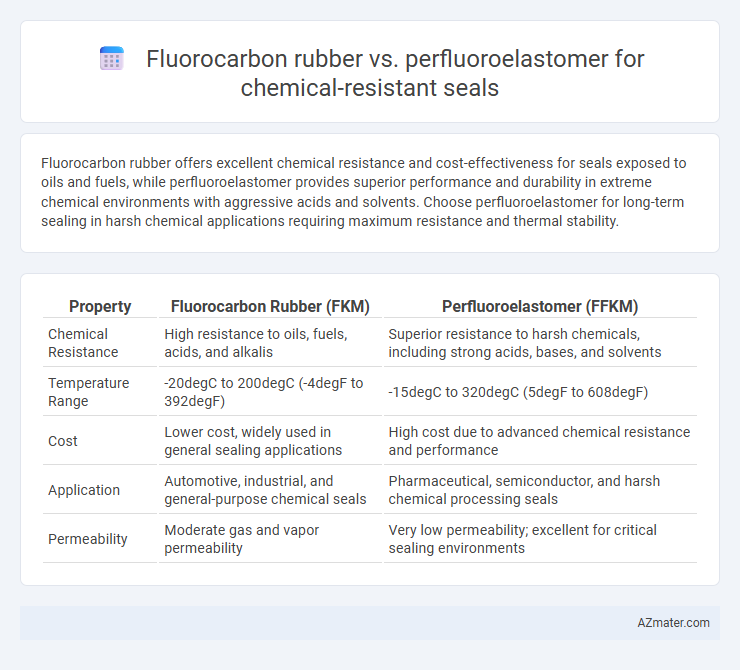Fluorocarbon rubber offers excellent chemical resistance and cost-effectiveness for seals exposed to oils and fuels, while perfluoroelastomer provides superior performance and durability in extreme chemical environments with aggressive acids and solvents. Choose perfluoroelastomer for long-term sealing in harsh chemical applications requiring maximum resistance and thermal stability.
Table of Comparison
| Property | Fluorocarbon Rubber (FKM) | Perfluoroelastomer (FFKM) |
|---|---|---|
| Chemical Resistance | High resistance to oils, fuels, acids, and alkalis | Superior resistance to harsh chemicals, including strong acids, bases, and solvents |
| Temperature Range | -20degC to 200degC (-4degF to 392degF) | -15degC to 320degC (5degF to 608degF) |
| Cost | Lower cost, widely used in general sealing applications | High cost due to advanced chemical resistance and performance |
| Application | Automotive, industrial, and general-purpose chemical seals | Pharmaceutical, semiconductor, and harsh chemical processing seals |
| Permeability | Moderate gas and vapor permeability | Very low permeability; excellent for critical sealing environments |
Introduction to Chemical-Resistant Seals
Fluorocarbon rubber (FKM) and perfluoroelastomer (FFKM) are two advanced materials commonly used in chemical-resistant seals, offering exceptional performance in harsh environments. FKM provides excellent resistance to fuels, oils, and many chemicals, making it a cost-effective choice for medium to high-temperature applications. FFKM delivers superior chemical and thermal resistance, withstanding aggressive chemicals, acids, and extreme temperatures, ideal for critical sealing applications in chemical processing and semiconductor industries.
Fluorocarbon Rubber (FKM): Properties and Applications
Fluorocarbon rubber (FKM) exhibits exceptional chemical resistance, high temperature tolerance up to 200degC, and excellent compressive strength, making it ideal for seals exposed to fuels, oils, and aggressive chemicals. Its molecular structure provides strong resistance to degradation by acids, alkalis, and hydrocarbons, ensuring long-lasting performance in automotive, aerospace, and chemical processing industries. FKM seals outperform many other elastomers in harsh chemical environments, balancing durability with cost-effectiveness compared to more specialized materials like perfluoroelastomers.
Perfluoroelastomer (FFKM): Properties and Applications
Perfluoroelastomer (FFKM) offers superior chemical resistance, high thermal stability up to 320degC, and outstanding resilience in aggressive environments, outperforming fluorocarbon rubber (FKM) seals. FFKM materials provide exceptional compatibility with a wide range of chemicals, including acids, solvents, and amines, making them ideal for critical sealing applications in semiconductor manufacturing, chemical processing, and aerospace industries. Their low gas permeability and excellent compression set resistance ensure reliable, long-lasting performance in harsh conditions where FKM seals may degrade prematurely.
Chemical Compatibility: FKM vs FFKM
Fluorocarbon rubber (FKM) offers excellent chemical resistance against hydrocarbons, oils, and fuels, making it suitable for many automotive and industrial applications, but it has limitations with strong acids and amines. Perfluoroelastomer (FFKM) provides superior broad-spectrum chemical compatibility, including resistance to aggressive chemicals, acids, bases, and oxidizing agents, making it ideal for the most demanding chemical sealing environments. FFKM's enhanced molecular structure enables sustained performance in extreme temperatures and harsh chemical exposures where FKM may degrade or swell.
Temperature Resistance Comparison
Fluorocarbon rubber typically withstands temperatures ranging from -26degC to 205degC, making it suitable for most chemical-resistant sealing applications but less effective at extreme heat. Perfluoroelastomer exhibits superior high-temperature resistance, withstanding continuous exposure up to 300degC and intermittent peaks beyond 320degC, ideal for demanding environments involving aggressive chemicals and elevated temperatures. This significant temperature endurance difference positions perfluoroelastomer seals as a premium choice in extreme chemical and thermal conditions.
Mechanical Performance and Durability
Fluorocarbon rubber (FKM) offers excellent mechanical performance with high tensile strength and good abrasion resistance, making it suitable for many chemical sealing applications. Perfluoroelastomer (FFKM) surpasses FKM in durability by providing superior resistance to extreme temperatures, aggressive chemicals, and prolonged exposure to harsh environments. The enhanced chemical inertness and thermal stability of FFKM ensure longer service life and reduced maintenance compared to fluorocarbon rubber seals.
Cost Analysis: FKM vs FFKM
Fluorocarbon rubber (FKM) offers cost-effective chemical resistance suitable for a wide range of applications, with prices generally significantly lower than perfluoroelastomers (FFKM). Perfluoroelastomers provide superior chemical, thermal, and mechanical performance, justifying their higher initial cost in demanding environments such as semiconductor manufacturing and aggressive chemical processing. The cost analysis favors FKM for budget-conscious projects requiring moderate resistance, while FFKM is preferred for high-performance seals where long-term durability and resistance to extreme conditions reduce replacement frequency and total lifecycle costs.
Typical Industries and Use Cases
Fluorocarbon rubber (FKM) is widely used in automotive, aerospace, and industrial manufacturing for seals exposed to fuels, oils, and moderate chemical environments due to its excellent resistance to hydrocarbons and high temperatures. Perfluoroelastomer (FFKM) seals are preferred in semiconductor, pharmaceutical, and chemical processing industries where extreme chemical resistance, thermal stability up to 327degC, and low permeability are critical for handling aggressive acids, solvents, and high-purity gases. Both materials serve essential roles in pumps, valves, and reactors, with FFKM providing superior performance in highly corrosive and ultra-clean applications.
Selection Criteria for Chemical-Resistant Seals
Fluorocarbon rubber offers excellent resistance to a wide range of chemicals, particularly hydrocarbons and oils, making it suitable for general chemical-resistant seals with moderate temperature requirements up to 200degC. Perfluoroelastomers exhibit superior chemical resistance, including strong acids, bases, and aggressive solvents, and maintain performance at higher temperatures up to 300degC, ideal for critical sealing applications in harsh chemical environments. Selection criteria prioritize chemical compatibility, temperature range, mechanical properties, and long-term seal integrity where perfluoroelastomers provide enhanced durability despite higher costs compared to fluorocarbon rubbers.
Conclusion: Choosing Between FKM and FFKM
Fluorocarbon rubber (FKM) offers excellent chemical resistance and cost-effectiveness for many sealing applications, making it suitable for environments with moderate chemical exposure and temperature requirements up to 200degC. Perfluoroelastomer (FFKM) provides superior chemical resistance, broad temperature tolerance (-20degC to 320degC), and exceptional durability in aggressive chemicals such as strong acids, bases, and solvents, justifying its higher price for critical, high-performance seals. Selecting between FKM and FFKM depends on the specific chemical environment, temperature range, and budget constraints, with FFKM preferred for extreme conditions and FKM for general-purpose chemical seals.

Infographic: Fluorocarbon rubber vs Perfluoroelastomer for Chemical-resistant seal
 azmater.com
azmater.com